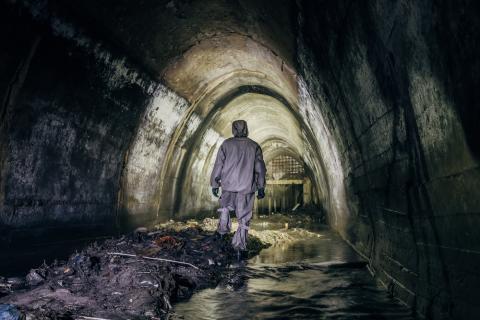Do your staff think about what they’re putting down the sink? Fatbergs are becoming an increasingly common problem for water companies, but they’re a problem that can be prevented with just a few simple changes.
Fatbergs – large masses of solid waste such as oils, fats and wet wipes – can cause serious issues in our sewer systems. The sheer size of the fatbergs we’re now seeing, such as the 64-metre fatberg recently discovered in Sidmouth, creates considerable blockages in the system. Removing them uses a large amount of resources, which could be better deployed elsewhere – dissecting the Sidmouth fatberg, for example, is expected to take workers around two months.
What causes fatbergs?
Much of our sewerage infrastructure has been in place since the Victorian era, and the old system is struggling to cope with some of the things that people put down the sink and the toilet.
Many people are misinformed about what they should and shouldn’t be flushing. Wet wipes may be marked as ‘flushable’, for example, but that doesn’t mean that they’re biodegradable – so while they will be fine flowing through your office pipes, they’re likely to clog up the pipes further along.
How can businesses ensure they’re not adding to the problem?
If you’re looking to make sure that your business isn’t contributing to a fatberg, you will need to work on changing employees’ behaviour and providing them with the equipment they need to dispose of waste responsibly.
Educating your employees on what they can and cannot pour down the sink, or flush down the toilet, is key. Many still think that it’s fine to pour cooking oil down the sink, for example, as long as they pour hot water and washing up liquid down first – but this is not the case, because oils and fats will simply solidify and congeal further down the pipe. In the bathroom, only human waste and toilet paper should be flushed – everything else, even wipes that are labelled ‘flushable’, should go in the bin. A simple way to ensure staff understand what not to flush is to stick posters up in key areas, such as in the bathrooms and in any staff or canteen kitchens.
Then you just need to provide employees with the means to change their behaviour - simply providing bins in the bathrooms can go a long way to ensuring staff don’t have to resort to flushing waste down the toilet, for example. You should already be providing specific sanitary waste bins in the female toilets, and you will need to employ a specialist company that will dispose of this waste appropriately. To avoid fats and oils being poured down the sink, keep a small container in the kitchens for staff to empty oil and fat into before throwing into the bin – an old margarine tub will work for this!
It doesn’t take much to affect these behavioural changes in your staff, but it could make a real difference to the state of our sewers. To find out more about how your organisation can ensure staff are water savvy in the workplace, visit our Insight area.

